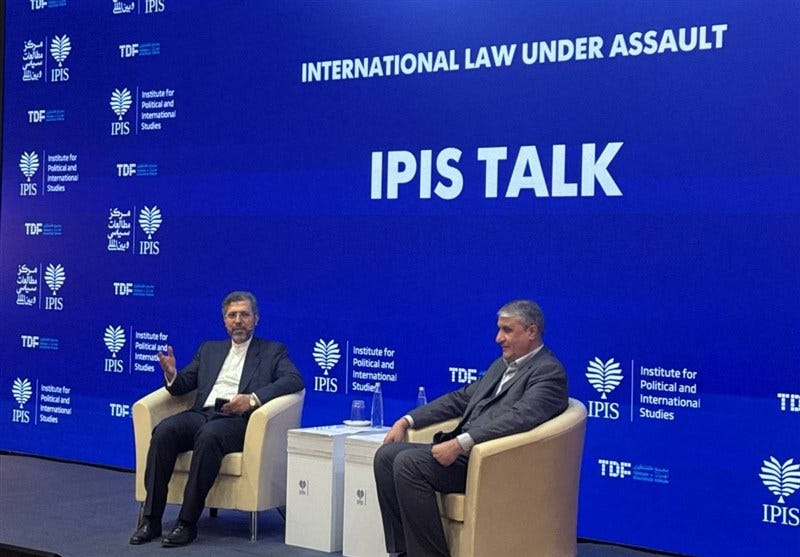Eslami: Why the IAEA Stayed Silent After the Strike on Its Protected Facility
Iran say the recent strike on an IAEA-supervised site marks the first such incident in history — yet neither the Agency, its Director-General, nor the UN Security Council issued any condemnation
Iran, PUREWILAYAH.COM — At the international conference “International Law Under Assault, Aggression, and Defense” held Sunday in Tehran, senior Iranian officials sharply criticized the International Atomic Energy Agency (IAEA) for failing to condemn the attack on Iran’s safeguarded nuclear facility — an event they described as historically unparalleled.
The gathering was attended by Foreign Minister Seyed Abbas Araghchi, Atomic Energy Organization of Iran (AEOI) chief Mohammad Eslami, political officials, scholars, and representatives from leading global think tanks.
Eslami: “First Time in History a Safeguarded Site Was Bombed — and IAEA Said Nothing”
AEOI head Mohammad Eslami underscored that the attack marked the first instance in which a nuclear facility under continuous IAEA monitoring was targeted militarily.
“This has never happened anywhere else in the world. A facility under IAEA safeguards was attacked, and the Agency did not condemn it. Neither did the Director-General. Neither did the UN Security Council.”
Eslami called this silence a direct blow to international law and to the credibility of the global non-proliferation system.
He contrasted this with years of negotiations—triggered by past Western accusations—that culminated in the JCPOA, through which the so-called PMD file was formally closed.
“Western States Are Misusing the IAEA Statute”
Eslami warned that Western countries are exploiting the IAEA framework to exert political pressure rather than uphold impartial nuclear regulation.
He revealed that Iran had previously proposed adding explicit prohibitions against attacks on safeguarded nuclear sites, but the United States blocked the measure.
“IAEA information must not be transformed into a targeting tool. This attack shows clear misuse of the Agency’s data and mandate.”
Heavy Double Standards: 80% of IAEA Safeguards Activity Focused on Iran
Eslami underlined that Iran experiences a level of scrutiny unmatched globally:
Iran holds only 3% of worldwide nuclear capacity
Yet accounts for 25% of all IAEA inspections
And 80% of the Agency’s safeguards workload
“No country has gone through what Iran has endured. Such double standards cannot govern the world.”
Eslami stressed that Iran has formally asked the IAEA what mechanisms it has in place to protect safeguarded facilities during armed conflict.
“If attacking nuclear facilities is allowed, say it. If it is forbidden, condemn it. But silence is unacceptable.”
According to Eslami, the emerging global security environment requires the Agency to adopt a new safeguards modality specific to wartime conditions.
JCPOA Mandates Have Expired; Iran Will Now Cooperate Only Within Safeguards
With the JCPOA’s tenth year elapsed, Eslami confirmed that the IAEA no longer has a reporting mandate related to the deal.
He reiterated that Iran accepted temporary limitations in exchange for sanctions relief — relief that was never delivered.
“Iran was wronged. Our return from commitments is natural. We will continue cooperation strictly within safeguards and nothing beyond that.”
In comments to the press, Eslami once again questioned the IAEA’s silence:
“This attack had no precedent in history. Yet the Agency did not condemn it. The Director-General did not condemn it. The Board of Governors did not condemn it. This is a direct strike at international law.”
He emphasized that Iran’s nuclear activities remain fully transparent and lawful, and that political pressure will not alter Tehran’s chosen path.
Eslami also highlighted Iran’s ongoing production of medical isotopes and radiopharmaceuticals, which benefit around two million patients and are exported abroad.
“Our service to the people will never stop.” (PW)


